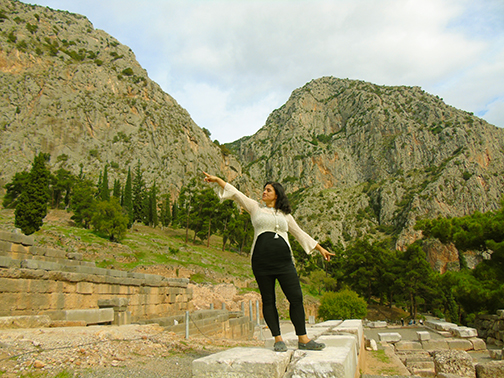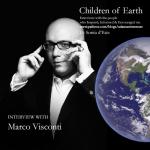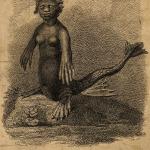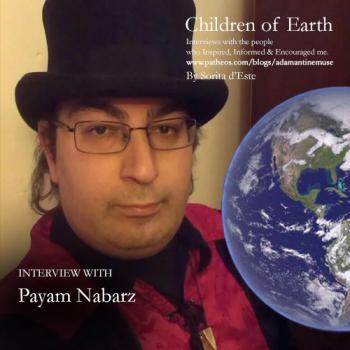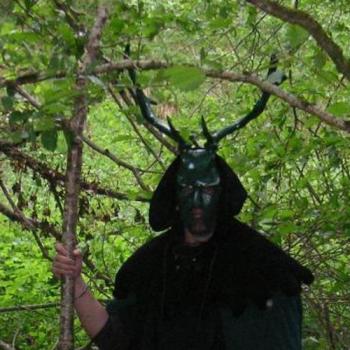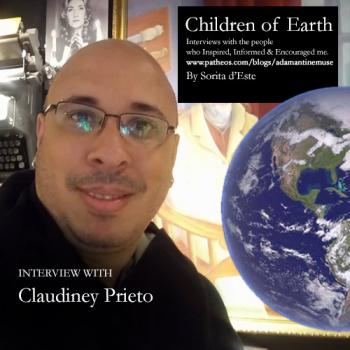Mark Townsend is a uniquely liminal man and Priest. He is an ordained Christian Priest who received that ordination more than 20 years ago in the Church of England, the largest Christian Church in the UK. Having walked away from the institution that is the C of E he explored Druidry and other Pagan paths, while maintaining his love of Jesus of Nazareth. This might appear to be a contradiction, and for many it would be unacceptable or too contrary – but Mark makes it work.
He is the author of numerous books exploring spiritual topics, including the collection Jesus Through Pagan Eyes, The Gospel of Falling Down, The Path of the Blue Raven and the Diary of a Heretic. Mark is also a magician. But not the type of magician you may expect someone like me to be interviewing – he is a stage magician, and a very entertaining one too!
I asked Mark about his reasons for leaving the Church, his views (as a Priest) on the idea that you can be a Witch and a Christian at the same time, and got him to share a little glimpse into his latest project….
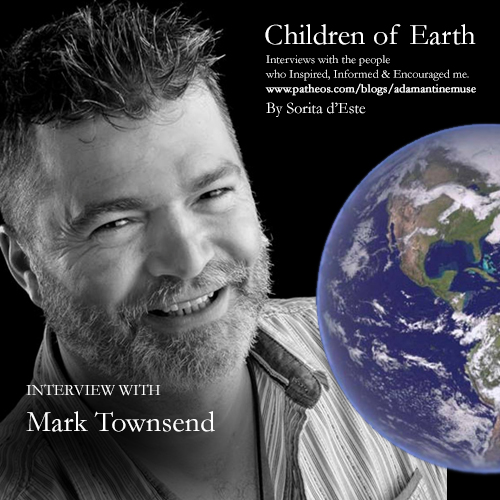
Interview with Mark Townsend
By Sorita d’Este
Children of Earth: People who Inspired, Informed or Encouraged me
Sorita d’Este: We first met through another author in Brecon, Wales nearly ten years ago. At the time, you were making significant life changes by leaving what had been a vocation for you as a Priest in the Church of England. This change in your life has inspired some of the books you have written too. Looking back on it now, how important was it to you to leave the Church of England?
Mark Townsend: Gosh is it almost ten years since we met Sorita? How time flies.
I would say that leaving the Church of England was not just important, but essential. My affection for the C of E has never dulled, but I found I could no longer be the person I am supposed to be (even ‘called’ to be) within the institution. I still look back and feel sad that it did not work out the way I had initially intended, for I’d worked long and hard to become an Anglican Priest. However, life never stands still. If we wish to grow we need to let go of anything that might hold us back. I sub-titled one of my books ‘From Religion to Re-Enchantment’ (Path of the Blue Raven) and that phrase pretty much sums up what I feel about leaving the world of organised religion (caricatured by the C of E). I increasingly found the orthodoxy of the mainstream Christian world far too restricting – almost like a straitjacket. When I took it off, I could breathe again and find magic in places I’d not felt able to go before.
Sorita: As part of your journey you explored not only Christianity, but also Pagan religions – and in particular Druidry. What drew you towards the Druid path and what do you feel you learned from it?
Mark: Yes indeed and one of the first things I was able to do once I’d unbuckled that straitjacket was to get in touch with a Druidic group and dive right in. I made contact with Philip Carr-Gomm, the ‘chosen chief’ of The Order of Bards, Ovates and Druids, explaining what had happened to me and that I was interested in his movement. In our correspondence, he also discovered that I was a magician (in the sleight of hand sense/something we’ll undoubtedly get to a little later on in this interview). It was autumn and Philip was preparing for their winter gathering at Glastonbury. Amazingly he invited me to speak and perform there (I think he thought it would be quirky to be able to introduce a C of E Vicar who did magic!). That evening changed my life. I took to them and their way of life like a duck to water, and have never looked back.
From Druidry I have found a way to articulate and express my deep love and reverence for nature. I find the monotheistic religions (and some eastern and gnostic paths) to be rather negative about earth, matter, and the physical/sensual world. Paganism and Druidry, on the other hand, embraces it and sees it as spiritual and imbued with the divine (if not, actually the divine itself).
I also love the symbolism, the energy, the joy and the sense of celebration in Druidic rituals. Of course sometimes Christian ritual can be equally vivid and alive (like a Roman Catholic vision quest / initiation rite I once had in the New Mexican desert with the inspirational Father Richard Rohr OFM) but this is the exception rather than the rule.
Druidry and Paganism have also taught me to see the world with magic in my eyes. I’m sure that I will talk later about this, but I have found my Pagan travels to be incredibly magical. Indeed I have felt accompanied by a totem / spiritual animal – on and off – for the last fifteen years and once wrote a book based on her. My blue raven.
Sorita: What label do you use for your current spiritual journey, and why?
Mark: Gosh, this is a question that I often ask myself. I’m tempted to say ‘eclectic’ but that might give a false impression – after all, eclectics are now seen as a ‘path’ within Paganism and I’m not sure that’s what I am. I’ll try to answer in a more detailed way, and I will do so with various points.
Point 1).
I was ordained a Priest by an Anglican bishop, and the Anglican tradition is part of the catholic (small ‘c’) or universal church whose ‘holy orders’ go back many hundreds of years. Traditional Roman Catholics (and many high church Anglicans) would say their orders go back to Jesus himself, but that’s not historically true. However, they do go back to the very early centuries of Christianity. And it has always been the belief (among Roman Catholics and high church Anglicans) that these orders are indelible and cannot be removed. Thus once a person is made a Deacon, Priest or Bishop through ordination/consecration he or she is ordained forever. Therefore I cannot not be an ordained Priest. I can, however, be a renegade or heterodox or heretical Priest (I guess that’s what I am in a way).
Hell, I could even be an agnostic or atheist Priest. Fact is – I was ordained back in 1996 and that cannot change.
That’s point 1). I am, in some sense, still a universal/catholic Priest (because I was ordained by an Anglican bishop). I hope that makes sense.
Point 2).
I have never really sat comfortably within the orthodox Christian tradition. Well, perhaps in the early days I did, but it didn’t last long. I have a naturally enquiring/inquisitive mind. Thus I ‘float about’ in my beliefs, and over the years, I have changed dramatically in my understanding of the central figure of the Christian story – Jesus of Nazareth. I am happy to still call myself a Christian (Christian Priest even), but only in a qualified way.
Having studied theology and biblical criticism I (and all trained Anglican clergy if they’re honest) know damned well that the Bible is a difficult book. It is difficult because it contains a vast array of literary ‘types’ – from history, to myth, to parable, to poetry, to some rather unsavoury projections. Indeed even the great (and conservative) C. S. Lewis once said that the psalms are, in places, quite devilish.
The writings about the central figure of Christianity – Jesus of Nazareth – are notoriously difficult. I think the next question in this interview will touch more on this, but let me just say that all educated Anglican clergy know very well that much of what we read in the New Testament about Jesus came from the early Church’s interpretation of him, rather than the historical figure.
[And yes I do believe there was a historical figure of Jesus. Very few serious scholars actually question that. The vast majority of even the most liberal and secular scholars don’t doubt that Jesus of Nazareth existed.]
I follow Jesus as a human teacher who points us all to our own divine sonship / daughtership, but not as the literal and only son of God who died to take away the sins of the world. That came later as a concept.
Point 3).
I am naturally open and eclectic. I do not see Christianity as the ‘one true way’ that all need to follow for salvation. So I’m happy to see any belief system that speaks to me as profitable for my faith/spiritual development.
Sorita: I was one of the many people you interviewed for the anthology Jesus Through Pagan Eyes in which you brought together interviews and articles with people from numerous Pagan paths and traditions. I imagine you were met with many different reactions when you started the process of contacting Witches, Druids, Priestesses and all kinds of people who would not usually be welcome in Christian circles and asking them to share their views on Jesus! Were you met with open arms or with some suspicion by those who didn’t know you personally already?
Mark: Ha ha, suspicion, oh yes. As well as being exciting and inspiring, this period was, for me, something of a re-adjustment. What I mean by that is that up until that point I’d probably been looking at Paganism through rose-tinted spectacles, as if it was only Christianity that could be narrow and blinkered. All the contributors to the book were charming, open, generous and very happy to help me. And all the ‘Pagan’ folk who knew me thought it was a great idea. But a fair few of those who didn’t already know of me were suspicious of my motives and some were even critical of those who contributed to the book. They saw me as some kind of poacher of Pagans for the church. To be fair, I can see why this might be the case. After all, there are Christians who mingle with and befriend Pagans with ulterior motives – evangelists in Pagan clothing if you like. But I am not one of these and have never been the remotest bit interested in ‘winning Pagans for the church’. Hell, I actually think that Christians could learn far more from Pagans than the other way round anyway. So I did come under a fair bit of attack from those who saw my attempts to build bridges as nothing more than an evangelistic ploy. And I also came across some quite harsh and unfair criticism about my book which, to me, showed a level of narrowness that I was unaware existed within the Pagan world.
Here’s an example. It is an extract from a review about my book:
‘As a soft pink and fluffy sop to both christianity and neo-pagan ways this book has the sort of “good feeling” and “happy ending” that Mary Poppins gives and about as much depth. This is unfortunate as there are fascinating points that could have been drawn with less fluffy thinking. I write this as an awenydd from a long family tradition of awenyddion (spirit keepers) that goes back over 4000 years in the village where I grew up, and is still there, hiding away in many others I’ve lived in. The Old Folk are very wary of talking with bouncingly keen christians such as Townsend, we remember too well how our people have suffered at their hands over the past two thousand years.’
Another example:
‘Yet another lame attempt of Christians to both invade Paganism/Witchcraft/Wicca and try to shame it at the same time.The book claims Pagan authors explore the “historical figure of Jesus”. Poppycock! REAL Pagans know there was no “historical Jesus”; “he” was a complete rip-off of the Pagan “dying and resurrected God king” of ancient agrarian societies. Shameful, pathetic, lame. DON’T waste your money!’
However, on the far more positive side, the vast majority of reactions have been amazing. I’ve been interviewed on American Pagan and Wiccan video-blogs by witches who feel that I’ve given them a real gift through my book. The book has had some very warm reviews by Pagans and even a fair few YouTube video reviews, again by many who feel they’ve been given something precious through it. Many ex-Christian Pagans felt they had been given a real gift. Allow me to explain. I am not talking about Pagans becoming Christians or Christo-Pagans here, but about being able to reclaim something they’d lost – which is some sort of relationship with Jesus, while remaining 100% Pagan.
Sorita: Did the responses you got from those who contributed to the book surprise or challenge you in any way?
Mark: Yes they did. I was surprised by the willingness of those I spoke with to be so generous with their offerings. While I encountered suspicion from some I did not feel any of this coming from those I interviewed, and there are some very well-known people among them. To give an example for your blog readers: Janet Farrar, Patricia Crowther (who I enjoyed a lovely tea with and who – because I’d travelled up to Sheffield to see her – set me off on my way with a little goodie bag for the trip home), Emma Restall Orr, John Michael Greer, Caitlin Matthews, Philip Carr Gomm, yourself of course Sorita… and many more utterly fascinating people.
And I found some of their responses to be incredibly insightful. Some of them saw Jesus more as a human with a special magical touch – almost shamanic or witch-like. Others saw him more in terms of as a god-figure. Some doubted in his historicity but saw the myth as equally as important to Greek or Celtic or Norse or Indian myths.
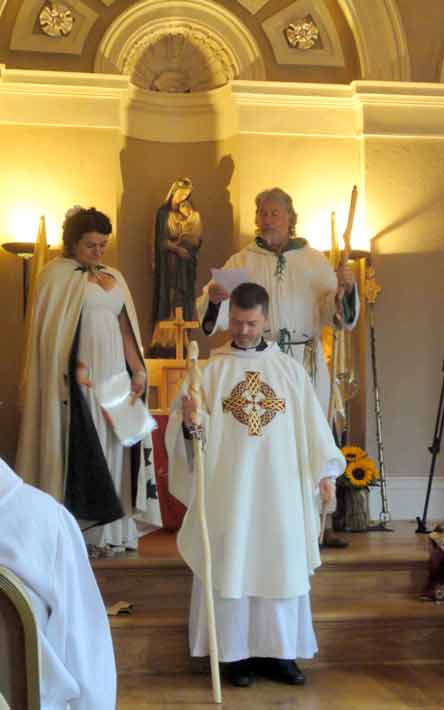
Sorita: You also had a re-ordination in 2011 into a more liberal Christian Church, which remarkably allowed you to have a blessing from me as a Priestess of the Goddess, and from another OBOD (Druid) friend of yours as part of the ceremony. I can’t imagine that this is a common occurrence in Christian circles, or that it ever happened before or since. Is the joining of Christian and Pagan philosophies and practices more common than we think it is?
Mark: It was a very special moment. But no I don’t think this is very common – sadly. I think that the Christian world still generally holds Paganism at arm’s length.
Let me say that there are some fabulous people I know, within the church, who are trying to bridge the gap and create common ground. Some have written excellent books on their experiences and encounters. One such book that I can wholeheartedly recommend – for those interested – is by Revd. Paul Cudby, a C of E clergyman. The book is called The Shaken Path.
Sorita d’Este: During your explorations of Pagan spiritualities, you have probably met more than one person self-identifying as a Witch, a contentious term with many meanings even among Pagans! There is some ongoing debate today about whether someone can be a “witch” and a “Christian” at the same time. What are your feelings on the idea of Christian Witchcraft and Christian Witches?
Mark: This is a difficult one for me to attempt to answer and, yes, I know many witches. In fact I was once invited to attend a Alexandrian [ed. Initiatory Wiccan Tradition] coven ritual for Halloween (yes, they called it Halloween rather than Samhain or any other more ‘Pagan’ term). Quite an experience!
I also know quite a few ‘Christian witches.’ I even have one friend who is a catholic clergyman and an Alexandrian High Priest. He keeps both sides of his spirituality totally separate though and does not subscribe to ‘Christo-Paganism’ which tends to blend the paths.
So, what are my feelings on the idea of a Christian Witch? Well in many ways I don’t see an issue, especially if one regards witches as being part of Wicca and therefore a spiritual tradition. I have no problem with Christians also being Buddhists or Hindus etc. So why should I have any issues with Wiccan Christians? Of course, some might say that the bible speaks out against witchcraft and magic. And it’s true that, in places, it does. But it also contains more positive glimpses of witchcraft and magic too – even ‘spell-craft’. Here’s an example. In the gospel of John (9:6) Jesus himself seems to heal a blind person’s eyesight by making a potion from his own saliva and earth. And what about the stories of the Wise Men? The words used is Magi = Magus (magician). They were clearly never kings originally and many versions of the bible still have them down as astrologers from the east. So, a religion that is said to be 100% against astrology actually has within its own sacred text a passage that claims that it’s divine founder was originally discovered through astrology.
And of course the more ceremonial/mystical traditions within Christianity are absolutely drenched in magic. For example, Roman Catholicism with its holy water, relics, prayers and novenas to the saints and supernatural understanding of the mass etc. And then, on the other hand, Pentecostal Christianity with its ‘ signs and wonders’ and, along with that, all the paraphernalia that can be used within the quest for miracles – laying on of hands, speaking in tongues, using ‘anointed’ items for healing etc. I’ve seen evangelists smearing ‘divine oil’ on thousands of letters, before sending them out with their attached blessings etc. (usually for a ‘love offering’ of anything over 100 dollars of course).
Yes magic is alive and well within Christianity, and even ‘black magic.’ In the past I’ve witnessed prayer meetings where the faithful pray ‘against’ groups or people that they see as ‘not of the lord.’ Often God is called upon to send angels to cause confusion among those who stand against the truth etc.
Surely invocating a god or a spiritual being to act unfavourably towards a person or people is a curse?
Sorita: You also do “stage magic” – and I remember coming to a show you did at St Mary’s in Hay on Wye in about 2009 or 2010. One of the things you said then, if I remember correctly, is that you believed that by doing sleight of hand magic you could help your audiences gain a better understanding of the Divine; or something like that. How did you get involved with stage magic, and how has it changed the way you understand religion?
Mark: I’ve been a student of performance magic for far longer than I’ve been a follower of religion. I was 9 years of age when my uncle first taught me a sleight of hand trick (how to vanish a playing card). I’m now 52 and am still learning, developing and inventing new effects and illusions. Of course, sleight of hand goes back far in the world of ritual and belief. It’s well known that many of the ancient Shamanic cultures used ‘trickery’ within their rites and ceremonies. It’s as if they knew what psychology would one day teach, that there is a psychosomatic dimension to some forms of medicine. For example healings were often accompanied by a display of ‘magic’ which convinced the person in need of the healing they were cured, thus aiding the process of belief. And, far from being a ‘con’ this visible sign of healing did actually provide the key to the healing itself. One such method was for a Shaman or medicine man to suck out the ‘poison’ in a person’s body and spit it out on the floor. When the person saw the worm wriggling away (which had been previously – secretly – concealed in the healer’s mouth) the ritual was far more likely to work.
For me magic has the effect of a Zen koan, it quietens and then opens the mind and makes possible the belief in the impossible. I’ve lost count of the times that beautiful synchronicities and genuine spiritual experiences occur whilst I’m performing stage magic.
Sorita d’Este: Are you working on any new projects?
Mark: Yes, I’m writing a new book and am also awaiting the publishing of another which is called The Traitor’s Child. I’m incredibly excited about it, as it’s my debut novel. The book is set in modern-day Amsterdam, but take us back through the centuries to medieval Granada (the southern / Muslim kingdom of Spain) and even further than that to India. It’s a mystery and the central figure is a young girl – an ex-catholic orphan – who ends up selling herself behind a glass window in the murky streets of the infamous Dutch Red Light District. However, she holds the key to the greatest deception the world has ever known! Intrigued? I hope so. It’s will be out early in 2020.
Sorita: What would you like to see change about the world we live in and our relationship with the Divine into the future for your children and grandchildren?
Mark: Sadly the precise opposite is actually happening all around us. The world seems to be growing smaller again – more insular, more tribal and polarised. I always hoped that it would grow in tolerance and openness but there are those in both the political and religious worlds who seem to want to take us back to the days where fear and suspicion dominate. And yes I see Trump, Brexit and the rise of populism as all part of that.
Sorita d’Este: Where do you see yourself 20 years from now?
Mark: I’ve never really been into ‘fortune telling’ so I really don’t wish to speculate.
Trivialities:
Your favourite book of all time? His Dark Materials (Trilogy), Phillip Pullman
Your favourite character from history? Can I have two of them? Jesus of Nazareth / and David Bowie
Your favourite element? Water
Your favourite food? Indian
Your favourite number? 4
Your favourite planet? Earth
Your favourite plant? Really don’t have one
Your favourite stone? Amethyst
Your favourite Tarot / Oracle deck? Druid Craft Tarot
Your sunsign? Pisces
Thank you to Mark for taking the time to participate in this project. If you enjoyed this Children of Earth interview, please share it with friends and leave comments / questions. You can find out more about Mark’s work by visiting his website www.magicofsoul.com, or reading his books:
- Diary of a Heretic: The Pagan Adventures of a Christian Priest
- Jesus Through Pagan Eyes: Bridging Neopagan Perspectives with a Progressive Vision of Christ
- The Gospel of Falling Down: The Beauty of Failure, in an Age of Success
- The Path of the Blue Raven
Who is Mark Townsend?
Mark Townsend is a combination of celebrant, magician and writer. He uses seemingly opposing forces as equal gifts in our search for the meaning of life. Mark’s books are recognised as being a touching place between Christianity and Paganism. As well as being an ordained priest, Mark is a member of The Order of Bards, Ovates and Druids – a world-wide fellowship of those to try to follow a nature-based way of life.
In June 2007 Mark resigned from fulltime parish ministry to work as a writer and mystifier. He has performed his ‘Soulful Magic’ all over the world – from Gothic Cathedrals to the African Savannah, entertaining such diverse groups as Catholic Nuns and Maasai Warriors. He also utilises his priestly skills as an Alternative Celebrant, and offers various rites of passage to folk who do not limit themselves to Christian practices. He creates meaningful services and blessings that reflect the spiritual paths of his wide variety of clients. He lives in Leominster, UK.
www.magicofsoul.com

